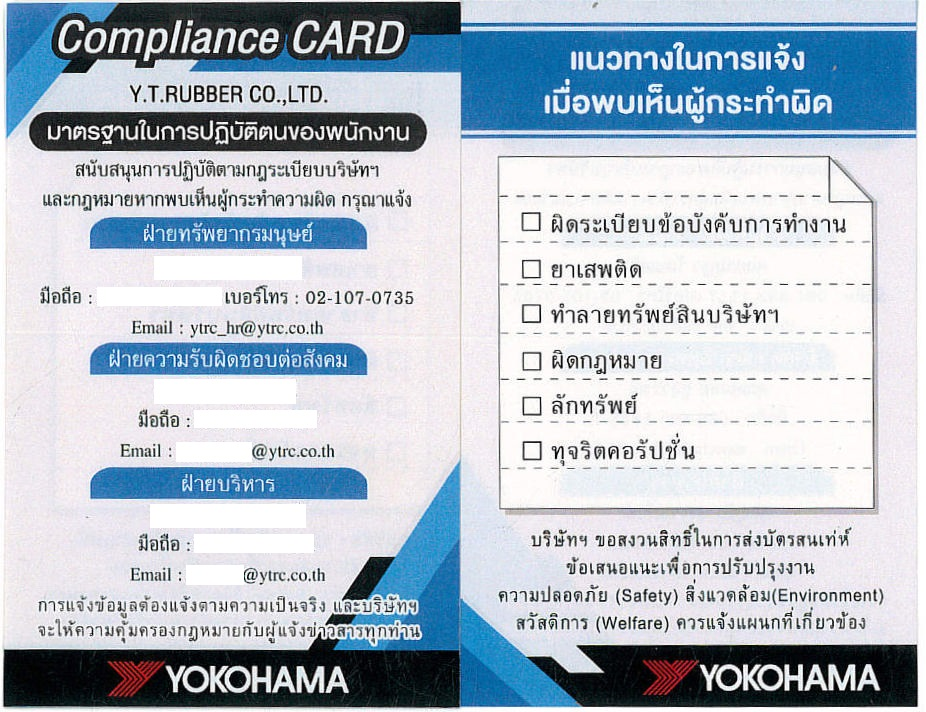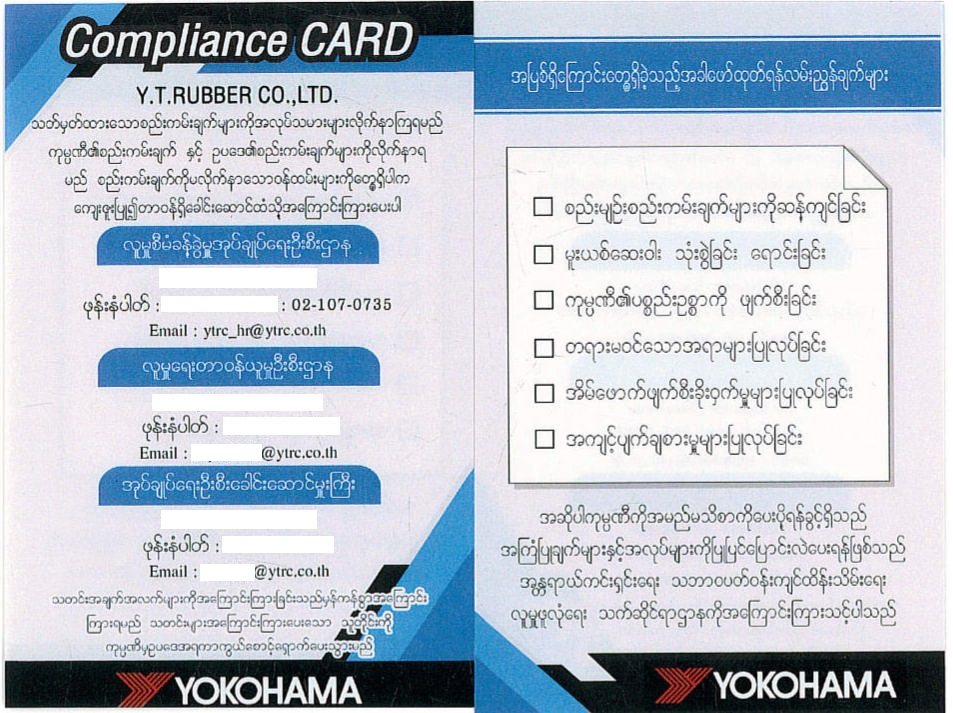Human Rights
Management
Stance
Human rights are the fundamental rights that have been granted to all people. When taking into consideration processes back to the stage of the procurement of raw materials, there are an extremely large number of people involved in Yokohama Rubber’s business and an extremely diverse range of human rights that should be respected. In addition, as our business activities expand on a global level and we become increasingly involved with a diverse range of people, the probability of having a direct impact or indirect impact on human rights violations increases.
Therefore, we believe it is important to fulfill our responsibility to respect human rights while taking into consideration the scope of such impact. Therefore, we have established the "Yokohama Rubber Group Action Guidelines" to indicate our internal and external efforts to respect human rights and to define the actions to be taken by our employees.
Furthermore, based on the United Nations Guiding Principles on Business and Human Rights*, we have formulated the "Yokohama Rubber Group Human Rights Policy" and are promoting initiatives aimed at respecting the human rights of all people involved in our business activities.
The Yokohama Rubber Group recognizes the importance of implementing Group-wide efforts to respect human rights as the basis of our business activities in order to contribute to the realization of a sustainable society as a company that is widely trusted by society.
- The Guiding Principles on Business and Human Rights were approved by the United Nations Human Rights Council in 2011 as a framework for respect for human rights applicable to all nations and all companies. The Guiding Principles place "the responsibility of companies to respect human rights" as an important pillar of the Guiding Principles, along with "the obligation of states to protect human rights.
Policy
Yokohama Rubber Group Action Guidelines
We shall respect human rights inside and outside the company
Yokohama Rubber Group Action Guidelines (established in December 2014)<Basic stance of the Yokohama Rubber Group>
We shall respect human rights, and shall not practice or be a party to discrimination or harassment.
<To put our basic stance into practice — our action>
- With an awareness of the diversity of the people working for us, we shall refrain from any action grounded in discrimination for reason of race, ethnicity, nationality, religion, sex, or other attributes. In addition, when we notice any such action, we shall resolutely point it out and urge its correction.
- We shall refrain from harassment in any shape or form.
- We shall not permit any violent behavior in the workplace.
The Yokohama Rubber Group Human Rights Policy
The Yokohama Rubber Group Human Rights Policy (established in April 2022)The Yokohama Rubber Group Human Rights Policy serves as the basis for all of the Group's business activities as its top human rights policy, based on the Corporate Philosophy and the Yokohama Rubber Group Action Guidelines.
Our Human Rights Policy applies to all officers and employees of the Yokohama Rubber Group (directors, auditors, executive officers, other persons associated with business execution in relation to management, and those in employment contracts with Yokohama Rubber Group companies, employees accepted on seconded and temporary employees). To ensure that our commitments to human rights can be realized in our business activities, we expect that all of our business partners including suppliers and distributors will also understand and support this policy.
CSR Procurement Guidelines
CSR Procurement GuidelinesThe CSR Procurement Guidelines have been revised in accordance with changes in social conditions and expansion of our activities. In October 2022, the guidelines were revised in line with the formulation of the "Yokohama Rubber Group Human Rights Policy" and other related policies. We will more strongly request our suppliers to protect human rights and prohibit discrimination and harassment in the supply chain.
Sustainable Natural Rubber Procurement Policy
Sustainable Natural Rubber Procurement PolicyYokohama Rubber practices respect for human rights in its Sustainable Natural Rubber Procurement Policy, which includes policies on respect for human rights, fair and equal treatment, harassment, child labor, forced labor, and appropriate working conditions.
Message from a manager
The Yokohama Rubber Group has adopted the slogan "Caring for the Future" in its environmental, social and governance (ESG) management, and in order to contribute to the realization of a sustainable society as a company that is widely trusted by society, we have established the "Yokohama Rubber Group Action Guidelines" and "Yokohama Rubber Group Human Rights Policy" as the foundation of our business activities, based on our "Corporate Philosophy." The Yokohama Rubber Group is fully committed to respecting human rights as the basis of its business activities.
As one of our efforts, we participate in the Platform for Sustainable Natural Rubber (GPSNR), which was launched by the Tire Industry Project (TIP) of the World Business Council for Sustainable Development (WBCSD), and we have been working to establish traceability of natural rubber, which involves various risks, including human rights and labor issues. TIP aims to ensure sustainable procurement of natural rubber, which is fraught with various risks, such as human rights and labor issues, by establishing traceability and taking into account the problems faced by local communities and farms.
For procurement items other than natural rubber, we plan to revise our CSR Procurement Guidelines to proactively request our suppliers to protect human rights and prohibit discrimination and harassment in the supply chain.
The Yokohama Rubber Group will share these ideas throughout the supply chains involved, respect the human rights of all people involved in our business activities, and continue to make improvements.
Gota Matsuo, Head of CSR Division
Vision for FY 2023
- We will respect human rights both inside and outside of the company, and respond sincerely to complaints concerning human rights and make improvements to ensure that there is no child labor or forced labor at the Group or our suppliers.
- Promote the introduction of a global whistleblower system to raise the level of compliance across the Group.
- We collate case studies of problems that have been experienced in the Group in the past, and we have put in place a system so that employees can learn from these case studies at important milestones in their careers, such as when being given new assignments or being promoted.
Main action items to be addressed first
Human Rights Grievance Mechanisms
(1) Grievance Mechanism for Yokohama Rubber Group's Domestic Employees
The content of human rights complaints also varies widely, and we recognize the importance of having a point of contact for direct consultation on human rights issues.
Complaints concerning human resources are jointly resolved by the Corporate Compliance Department and HR departments.
<Scope of use of the system for handling complaints concerning human rights>
<Methods for spreading awareness of the system for handling complaints concerning human rights>
<Resolution process when a complaint is submitted>
- The Corporate Compliance Department confirms the facts related to the consultation by the whistle-blower.
- The necessary measures are taken in consultation with the HR department.
- The results are directly reported to the whistle-blower if they have disclosed their name. Reminders are issued within the company as necessary if the whistle-blower is anonymous.
<Monitoring of the effectiveness of the system for handling complaints concerning human rights>
(2) Grievance mechanisms for all domestic and international stakeholders
<Scope of Grievance System Use>
Incidents at Yokohama Rubber Group companies, supply chains, value chains, etc. are also covered.
<How to make the use of the grievance system known to the public>
<Resolution process when a complaint is submitted>
- JaCER will check the contents of the reported case, and if it is judged as a complaint case, JaCER will contact the Compliance Department.
- The Compliance Department confirms the fact of the content of the report contacted by JaCER.
- The Compliance Department shall take necessary measures through consultation with JaCER and the relevant departments within the Company.
- If the whistleblower reveals his/her name, the result will be directly communicated to the whistleblower. Regardless of whether the caller is named or anonymous, information on the progress of the case will be regularly updated in the list of complaint cases posted on the JaCER's website.
<Monitoring the effectiveness of the grievance system>
Education and awareness of compliance cards at YTRC

Compliance cards in the Thai languages

Compliance cards in the Myanmar languages
Front side
Code of Conduct for Employees
Please follow the rules. If someone does not follow the rules, please notify the following
- Human Resources contact information*
- Contact information for compliance officers*
- Management (department head) contact information*
*Phone number and email address, Myanmarese interpreters are available.
Back side
If anyone does not follow the rules in the following
- Violation of company rules
- Drug Use
- Destruction of Company Assets
- illegal activity
- theft
- General non-compliance
Main action items to be addressed first
The following items have been established as the main action items that the Yokohama Rubber Group will address first, taking into account the level of impact of business activities and the level of social interest.


